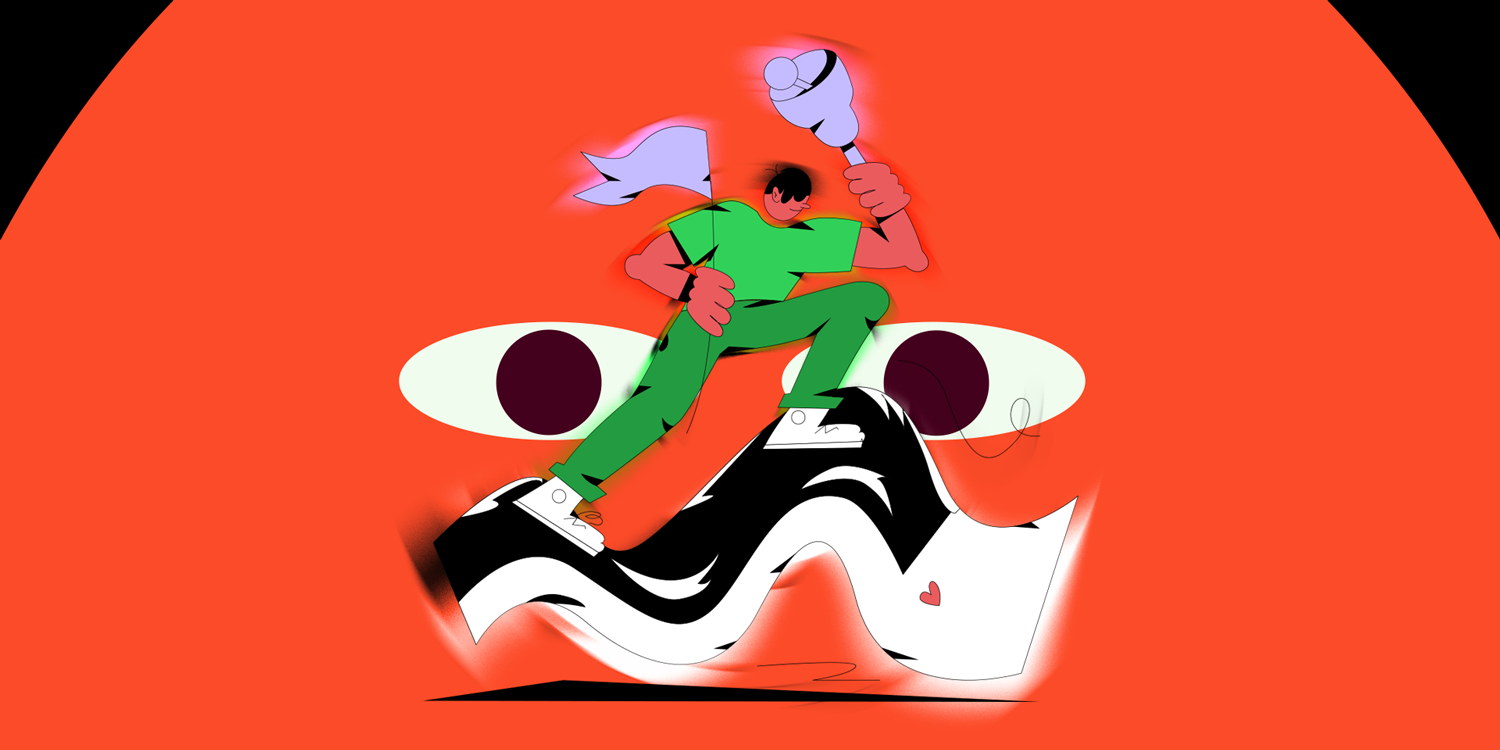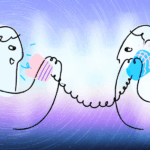By Andrea Jones
“Mama, what’s a hypocrite?” My 8-year-old daughter asked as we braved the morning drive to school. I’d actually just demonstrated how to be a hypocrite by calling someone else one.
“It’s another word for humanity,” I said in the spirit of true sarcasm.
She knew my tone well enough to respond with a sarcastic laugh herself and say, “No, really, what does it mean?”
I gave her the less-exciting Webster definition. “A hypocrite is someone who says one thing while doing the opposite. Like, ‘Hey don’t cut me off,’ but then they cut in front of someone else.”
“Like that guy who just cut us off?”
“Yes. When if I did that to him, he’d probably shoot me.”
She laughed again at her still brilliant mama. But then I felt that pang of guilt owned by all Christians who say one thing while doing another.
“We can all be hypocrites, babe. I was one when I called that man a hypocrite. I tell you not to call names, but then I just did it. So … sorry.”
I proceeded to go on with my mama diatribe about this is why we need God to help show us our blind spots: how we have a hard time seeing things from the right perspective when our eyes are on ourselves, and so on. She now tuned me out as we approached the end of the school car line and said, “OK, mom. Quick. Pray for me.”
I did what I do every day at that spot and prayed weakly, “Lord, help us not to be hypocrites. Protect my girl today and give her joy. Amen.”
As I drove away, I couldn’t help but think about it all — the ins and outs of hypocrisy. The science of it all came to me first.
The evolutionist would say we are the way we are because it is a matter of survival of the fittest. A baby screams for the things that they need to survive. We grow to do the same throughout our life. The weakest in the pack doesn’t survive. Or do they? Which pack are we talking about? Which continent and in what situation?
If we use this thought to apply to the driver on the road with me today, he ended up getting stuck in traffic right along with me. In fact, he was right in front of me. And the flailing of his arms seemed to show me: 1. He was going to give himself a heart attack. 2. His selfishness was going to get him in a car accident. Maybe.
If we use cultural sociology to interpret his actions, then we might say he wasn’t raised correctly. Perhaps his parents failed to give him the values of our culture, which caused him to be inconsiderate of others or disobedient to the laws of our society. He drove down the shoulder to get ahead of everyone. That’s just plain wrong in our society. Maybe this is just one of many ways he’s been taught to cheat those around him. It was the family culture he was raised in that brought him to this ugly reality in his life.
If we use Sigmund Freud or some form of psychology to interpret his actions, then he is most likely suffering from some sort of envy. His feelings of less-than-ness are causing his narcissism.
The humanitarian will say it’s because he’s not yet found his purpose. When he finds the joy of serving others and loving others, he will change.
The Christian will call it his sin nature — the desire to be God above all else.
My thoughts went on. Why was this man such a dud? And why do I feel justified in judging him when I can be the exact same way? Why am I such a hypocrite?!
Ideals Put to the Test
Unfortunately, the Christian worldview doesn’t stop us from being hypocrites. In fact, our high standards almost make it inevitable that we’ll excel in hypocrisy. Hypocrisy occurs when our ideals are put to the test. It occurs in the moment we come face to face with something that seems more emotionally or physically pleasing to us than our ideals.
It felt better to me (in the moment) to call that man a name rather than hold to my Christian ideals. He stressed me out, and he was making me later to where I needed to go.
_
“Science is now showing that the same part of the brain that controls feelings of stress and anxiety also controls the feelings of thankfulness.”
_
The Golden Rule and Thankfulness
The fact of the matter is: We all have the susceptibility to live like little evolutionists, while hoping others will be Christian humanitarians. In our brokenness, we seek first to be the fittest in our kingdom and expect others to live out the Golden Rule. Yet it seems to me, the actual fittest among us are those who strive to live the Golden Rule.
As weak as it may seem on the surface, the one living for the advancement of others actually wins. They aren’t stressed out with self-survival, the need to be first, and the frustration brought on by the front-of-the-line frenzy. Science is now showing that the same part of the brain that controls feelings of stress and anxiety also controls the feelings of thankfulness. So we cannot simultaneously be stressed and anxious about someone cutting us off on the freeway and thankful at the same time.
The second I begin to change my perspective on that man on the road, and stop stressing about getting my kid to school on time and instead thank God for extra time in the car with my daughter, all my anger and frustration and fight with that stranger on the road are dissipated.
_
“The lives of those I admire exhibit that cultureless truth that Christ modeled to us: Treat others how you want to be treated (Matthew 7:12).”
_
Laying Down Our Lives
There is a reason why we all love the great Christian humanitarians of history. Just thinking of Mother Teresa, Amy Carmichael, or Martin Luther King Jr. makes me feel enlightened. Peaceful. Christlike.
The strength of my heroes is not in their power, their judgment, or their cynicism. Their influence was how they lay down their life for the life of someone else — for the lives of those who were marginalized or seen as unworthy. And this is what made them the strongest in our human pack.
The lives of those I admire exhibit that cultureless truth that Christ modeled to us: Treat others how you want to be treated (Matthew 7:12). Even non-Christians like Mahatma Gandhi fought their own hypocrisy with this Christian mantra. Gandhi vowed to not eat until those at war in his country began treating one another how they wanted to be treated. Rather than striving like the evolutionist does to be on top of the trash heap, those who live out the Golden Rule build a whole new world paradigm.
In letting someone go in front of me, I will never be cut off. In laying down my life, my life can never be stolen from me. In not striving to be more than a peer, I will never feel less than.
Beauty in Imperfection
So how do we fight our own hypocrisy? All the filters on our phones, on our social media presence and on our public lives don’t help us much. In the past it was only the movie stars who got to filter out their blemishes. Now spiritual leaders can present one airbrushed life online while living a completely contrary life privately.
The temptation is even greater for us to lift that false mask to our faces and hide.
Yet something is happening among this emerging generation. They have been raised on filters and social media frauds. It’s now becoming an art to show beauty in imperfection.
Freckles, wrinkles, and a-less-than-perfect appearance are becoming popular. There is a searching for authenticity and a discerning of frauds. The question I’m hearing from my teen’s room via her peers is: “Are they like that IRL?” (teen slang for “in real life”).
There is no better time for the church to shine. So how can we lean into this art of being real in a filtered world?
- Be real about our broken places while striving for holiness. First we must be honest about it. Confess it. Ask God to help us identify it. Or if we have kids, ask them!
- Seek those we can be mentored/counseled by as we navigate the jagged crags of life. Sometimes the places we are trying to filter the most are the very spots God wants to open up and bring real healing in us and through us IRL to experience the freedom of being real.
- Change our perspective on what we perceive to be beneficial to us. There is an eternal truth in Matthew 7 that even the unbeliever recognizes. If we must strive, strive to treat others how we want to be treated. The endorphins we get in letting someone go in front of us outweighs the stress of getting to the front first.
If I’m going to teach my daughter anything that matters in this life, it will be this: that identifying and eliminating hypocrisy starts with me.
+

Andrea Jones is a Free Methodist pastor who serves as the co-lead at the Abbey Church in San Diego. She has more than 20 years of ministry experience, and she is the co-founder of NewBreed Training. Before NewBreed, she served as a missionary in Thailand. She has been involved in planting multiple churches, both in the United States and in Europe.











